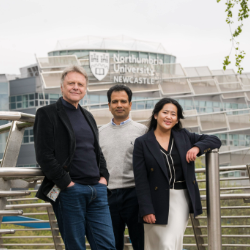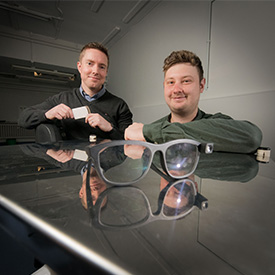-
Study
Study
Interested in studying at Northumbria? With 31,500 students, Northumbria is one of the largest universities in the country, offering courses on either a full-time, part-time or distance learning basis.
Discover more-
Undergraduate
- Undergraduate Study Degree
- Undergraduate Open Day & Events
- Application Guides
- Northumbria University UCAS Exhibitions
- Foundation Years
- Undergraduate Fees & Funding
- School & College Outreach
- Continuing Professional Development
-
Postgraduate
- Postgraduate Study Degree
- Postgraduate Research Degrees
- Postgraduate Open Days and Events
- Postgraduate Fees & Funding
- Flexible Learning
- Thinking about a Masters?
- Continuing Professional Development
- Change Direction
-
Student Life
- The Hub - Student Blog
- Accommodation
- Life in Newcastle
- Support for Students
- Careers
- Information for Parents
- Students' Union
- Northumbria Sport
-
-
International
International
Northumbria’s global footprint touches every continent across the world, through our global partnerships across 17 institutions in 10 countries, to our 277,000 strong alumni community and 150 recruitment partners – we prepare our students for the challenges of tomorrow. Discover more about how to join Northumbria’s global family or our partnerships.
Discover more-
Applying to Northumbria
- European Union
- Our London Campus
- Northumbria Pathway
- International Events
- Entry Requirements
- Agent Network
-
Northumbria Language Centre
- Faculty Requirements
- Acceptable English Requirements
- Pre-Sessional English and Study Skills
- Academic Language Skills Programmes (ALS)
-
International Fees, Funding & Scholarships
- International Undergraduate Fees
- International Undergraduate Funding
- International Masters Fees
- International Masters Funding
- International Postgraduate Research Fees
- International Postgraduate Research Funding
- International Money Matters
-
Life at Northumbria
- International student support
- The Hub - Student Blog
- Careers
-
International Mobility
- Current Northumbria Students
- Incoming Exchange Students
-
-
Business
Business
The world is changing faster than ever before. The future is there to be won by organisations who find ways to turn today's possibilities into tomorrows competitive edge. In a connected world, collaboration can be the key to success.
Discover more -
Research
Research
Northumbria is a research-rich, business-focused, professional university with a global reputation for academic quality. We conduct ground-breaking research that is responsive to the science & technology, health & well being, economic and social and arts & cultural needs for the communities
Discover more -
About Us
-
About Northumbria
- Our Strategy
- Our Staff
- Our Partners
- Student Profiles
- Alumni Profiles
- Leadership & Governance
- Academic Departments
- University Services
- History of Northumbria
- Contact us
- Online Shop
-
-
Alumni
Alumni
Northumbria University is renowned for the calibre of its business-ready graduates. Our alumni network has over 236,000 graduates based in 178 countries worldwide in a range of sectors, our alumni are making a real impact on the world.
Discover more - Work For Us
What will I learn on this module?
You will learn about the theory and application of the technology of wind, photovoltaic and hybrid renewable energy conversion systems. These technologies will be introduced such that their fundamental principles allow system design to be defined and performance optimised. Topics covered will be selected such that both stand-alone and hybrid systems may be specified, for example:
• Renewable resources, their characteristics and stochastic modelling
• Wind turbines: components and performance measures, conceptual design, structural loads, blade and tower structural design considerations, operation and control
• Aerodynamics of wind turbines: blade element momentum theory, blade aerodynamic design
• Photovoltaic: conversion theory and technology, sizing and design considerations
• Storage systems: power and cost modelling
• Hybrid systems: power, cost and reliability/availability analyses and system architecture design for various configurations including wind, PV, battery, diesel and fuel cell
How will I learn on this module?
Active learning sessions will allow you to engage with and appraise specialist knowledge and assist you in exploring and critiquing key concepts and topics within the module. Sessions will involve a combination of content delivery and practical learning exercises to enable you to apply your learning to complex and authentic engineering problems.?A problem-solving focused curriculum will allow you to explore and analyse solutions to complex challenges in relevant subject areas. Learning activities will enable the facilitation of creative thinking approaches to solve open-ended engineering problems.
How will I be supported academically on this module?
During your active learning sessions, academic support will be available to facilitate your exploration of the problem-solving activities. Formative feedback will be provided by the module team, including answering student queries and providing guidance concerning the module such as assessments and your academic progress. The electronic learning platform (eLP) provides a comprehensive resource for integrated learning incorporating learning materials and reading lists that will facilitate directed and self-directed learning. Contact with academic tutors and your peers outside formal teaching hours is encouraged through dedicated ‘office hours’, discussion boards and messaging systems within the eLP. Professional support staff, such as Ask4Help, provide the first point of contact for a range of queries, including, for example, those concerning assessment submission, late submission/extensions, and other administrative issues.
What will I be expected to read on this module?
All modules at Northumbria include a range of reading materials that students are expected to engage with. The reading list for this module can be found at: http://readinglists.northumbria.ac.uk
(Reading List service online guide for academic staff this containing contact details for the Reading List team – http://library.northumbria.ac.uk/readinglists)
What will I be expected to achieve?
Knowledge & Understanding:
MLO1. Apply a comprehensive knowledge of mathematics, statistics, natural science, and engineering principles to the solution of complex problems in Wind, Photovoltaic and Hybrid Renewable Energy Systems. (M1)
MLO2. Select and critically evaluate technical literature and other sources of information to solve complex problems. (M4)
Intellectual / Professional skills & abilities:
MLO3. Select and apply appropriate computational and analytical techniques to model complex problems, discussing the limitations of the techniques employed. (M3)
Personal Values Attributes (Global / Cultural awareness, Ethics, Curiosity) (PVA):
MLO4. Formulate and analyse complex problems to reach substantiated conclusions, evaluating data using science and engineering principles, working with uncertain or incomplete information, discussing the technical limitations. (M2)
MLO5. Communicate effectively on complex engineering matters with technical and nontechnical audiences, evaluating the effectiveness of the methods used. (M17)
How will I be assessed?
Formative Assessments
Academic staff on the module will assess you in a formative manner to help build your confidence and highlight any improvements required to meet the MLOs.
Your formative feedback will be given to you either verbally by academic staff on the module during formally scheduled teaching sessions or using the eLP. Your formative feedback aims to help you learn and prepare for the submission of your summative assessment.
Summative Assessment
Component 1. Coursework 001 (30%)
This component includes tasks such as technical literature research and computational and analytical modelling work on the core subject in a written report (2500 words or equivalent). It will assess MLOs 1, 2, 3
Component 2. Coursework 002 (70%)
This component requires students to conduct a set of research tasks and complete with a technical report (3500 words or equivalent) which will assess MLOs 1, 4 and 5.
Feedback will be provided electronically through the eLP within 20 working days of the date of submission.
Pre-requisite(s)
None
Co-requisite(s)
None
Module abstract
This module aims to provide students with a critical understanding of the theories and principles relating to wind turbines and photovoltaics, and the design and sizing of standalone and grid-connected hybrid renewable energy systems. On completion of this module, the student will be able to conduct essential calculations for the analysis of aerodynamic, mechanical and structural components of wind turbines. In addition, the student will be able to carry out conceptual and system-level design for hybrid renewable energy systems. Learning and teaching will be carried out through lectures and workshops, in which students use the state-of-the-art of the software tools and work on their wind turbine design and hybrid renewable energy system design projects.
Course info
Credits 20
Level of Study Postgraduate
Mode of Study 16 months full time
2 other options available
Department Mechanical and Construction Engineering
Location City Campus, Northumbria University
City Newcastle
Start January 2025
All information is accurate at the time of sharing.
Full time Courses are primarily delivered via on-campus face to face learning but could include elements of online learning. Most courses run as planned and as promoted on our website and via our marketing materials, but if there are any substantial changes (as determined by the Competition and Markets Authority) to a course or there is the potential that course may be withdrawn, we will notify all affected applicants as soon as possible with advice and guidance regarding their options. It is also important to be aware that optional modules listed on course pages may be subject to change depending on uptake numbers each year.
Contact time is subject to increase or decrease in line with possible restrictions imposed by the government or the University in the interest of maintaining the health and safety and wellbeing of students, staff, and visitors if this is deemed necessary in future.
Your Learning Experience
Find out about our distinctive approach at
www.northumbria.ac.uk/exp
Admissions Terms and Conditions
northumbria.ac.uk/terms
Fees and Funding
northumbria.ac.uk/fees
Admissions Policy
northumbria.ac.uk/adpolicy
Admissions Complaints Policy
northumbria.ac.uk/complaints














